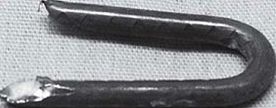After some great info in Part 1 about the parts of a nail, we’re going outside to look at specific nails made for outdoor construction.
You know what I mean – that fence, deck or patio you’re planning on tackling. Or the cedar shakes you need to get on the shed or gazebo. How about the chicken wire you put up around the garden or the retainer ties stacked up along the driveway? All of these projects require nails to keep them strong and stable, and not just any type of nail, but those made to withstand the elements.
Deck and Landscaping Projects
![]()
Patio/Deck Nails are available in a variety of sizes and gauges. This nail comes in both spiral and ring shank and is used to nail deck board and framing
![]() Patio Casing Nails are similar to a patio/deck nail, except this one has a casing or finishing nail head so that it can be countersunk. Perfect for railings and detailed trim work.
Patio Casing Nails are similar to a patio/deck nail, except this one has a casing or finishing nail head so that it can be countersunk. Perfect for railings and detailed trim work.
These are different than common nails for two main reasons: First, the shank on a decking nail is always spiral or ring. This is done to keep the nails from backing out once they’re hammered in. Spiral is best to use with the end grain. Secondly, and most important when you’re working outside, decking nails are hot-dipped galvanized (we previously talked about selecting the right material). Both of these processes give the nail material a rough exterior that acts like a protective barrier against corrosion. Heat-applied methods provide more zinc than regular electro-galvanizing does, creating a stronger, more weather resistant nail. Hot-dipped galvanized nails are also better to use with treated lumber. Be sure they are rated for use with ACQ (the most commonly used lumber treatment method).
Fencing
 Other than the fence nails and fence staples covered in Part 1, you might also need to use a chicken wire staple or poultry net staple. Attach those handy rolls of light wire to wood posts with this hardware and create a quick boundary for… whatever. Even if you don’t have chickens, chicken wire is extremely useful. Keep rabbits and other critters out of your garden, provide a structure for vines and other plants or simply put up a quick visual border in your yard.
Other than the fence nails and fence staples covered in Part 1, you might also need to use a chicken wire staple or poultry net staple. Attach those handy rolls of light wire to wood posts with this hardware and create a quick boundary for… whatever. Even if you don’t have chickens, chicken wire is extremely useful. Keep rabbits and other critters out of your garden, provide a structure for vines and other plants or simply put up a quick visual border in your yard.
Miscellaneous
![]() Timber Tie Nails are similar to a spike, but it comes in a shorter length and has a thinner shank for minimal splitting
Timber Tie Nails are similar to a spike, but it comes in a shorter length and has a thinner shank for minimal splitting
![]() Fine Nails are sometimes called “lobster pot” nails and have a thin shank that is ideal for thin, wood-like furring straps and even plywood (or if you happen to be assembling lobster crates, you’ve found the perfect nail). Good for cedar shakes, too.
Fine Nails are sometimes called “lobster pot” nails and have a thin shank that is ideal for thin, wood-like furring straps and even plywood (or if you happen to be assembling lobster crates, you’ve found the perfect nail). Good for cedar shakes, too.
Tool Stipulations
You may be using a certain tool for your outdoor project that demands a certain nails. Nail guns, for instance, often use coil nails – which are generally decking or fence nails attached with a thin bead of metal to form a coil. Other guns use a clip system. Find out from the tool manufacturer or operating manual exactly what type of nail is needed and in exactly what form.
Stainless Steel
For premium fasteners for outdoor construction, rely on stainless steel. It may cost you a little more, but the dependability and strength are well worth it. Decking and fence nails come in stainless, as well as common and box nails.
Check back for the last article in this series where we’re going to cover nails for those Roofing and Siding projects on your list.

